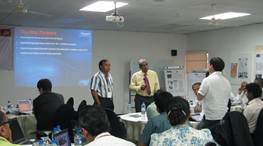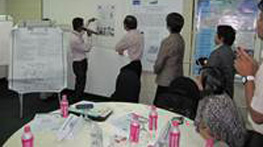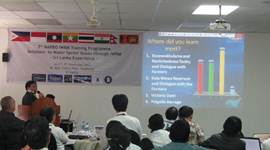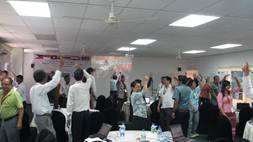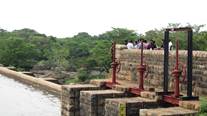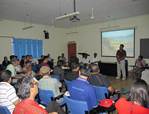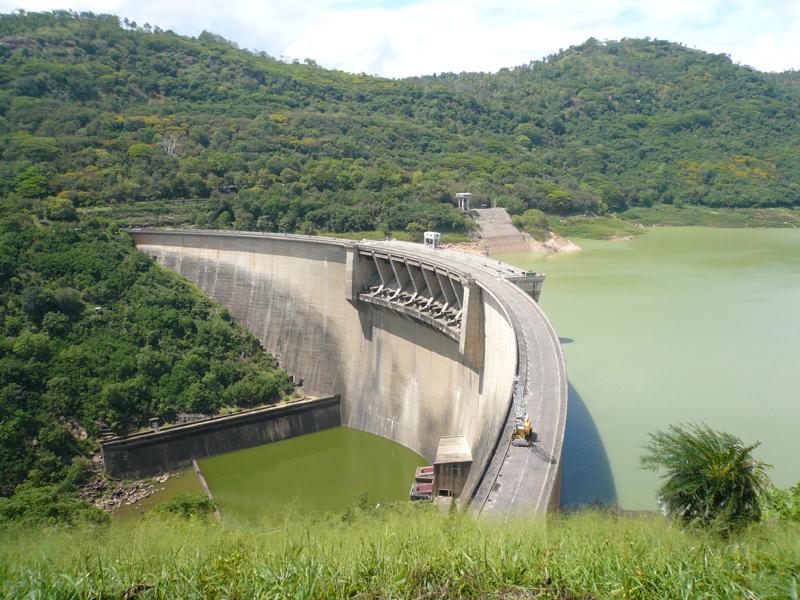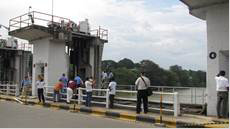NARBO
Report of 7th NARBO IWRM training in Sri Lanka
Mariko ASADA (JWA), Tomonobu SUGIURA (ADB)
![]()
Background of the IWRM training
From 2004, NARBO holds its training on IWRM (Integrated Water Resources Management) almost every year as a capacity building program for river basin organizations (RBOs) and government agencies. The objective of the IWRM training is to assist mid-level RBO managers and practitioners of water resources management to better apply IWRM approaches at basin-scale. Through a mix of disciplinary studies and case studies, the IWRM training helps participants develop their capacity to understand, introduce, implement and improve IWRM in their respective river basins.
The 7th IWRM training was held in Sri Lanka in the Mahaweli River basin. As Sri Lanka had experienced floods in 2011 and serious drought in 2012, participants was expected to learn water-related disaster risk management from Sri Lankan experiences.
Outline of the training
The 7th IWRM training was held from Nov.2nd to 9th 2012 at MAS Fabric Park in Thulhiriya, which is located around 65km northeast of Colombo in Sri Lanka. 26 participants, who work for RBOs or governments, came from 8 countries (India, Indonesia, Lao PDR, Myanmar, Nepal, Philippines, Sri Lanka, and Thailand), expecting to study and enhance their knowledge about IWRM through Mahaweli River basin experiences. Total 8 days’ training including 2days’ field visit (4th & 5th day) was carried out hosted by MASL (Mahaweli Authority of Sri Lanka).
Participants
Experts from MASL and other relevant institutes, and NARBO members gave lectures not only on IWRM-related matters using “IWRM Guidelines at River Basin Level” (Published by UNESCO in cooperation with NARBO), but Mahaweli river basin’s wide variety of subjects such as history of MASL, hydropower, irrigation, data collection, climate change adaptation, food security, domestic water issues、as case studies. During lectures, participants were very eager to learn and actively asked a lot of questions. They also actively expressed their views on these subjects so that they could enhance their comprehension.
Participants were also well prepared to have brought Posters, which they had been asked to make about their RBOs and activities. They introduced their Posters one by one on the 2nd & 3rd day of the training.
Lectures |
Poster session |
What the hardest but the most important parts of the training might be some group works. The subject was about IWRM progress of their own countries or basins as a final session of the training on the 8thday. After presentations, participants including NARBO chairperson, NARBO vice-chairpersons, NARBO senior advisors and NARBO secretariat discussed how to embed IWRM on their countries or basins.
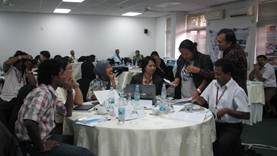 |
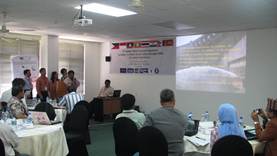 |
Group works |
|
After the last lecture of each day, NARBO secretariat wrapped up the seminar by using clicker system to get frank but severe evaluation about all the lectures and the training including accommodations. Overall the course was assessed as satisfactory (96% rated the course as good or very good) and had met the participants’ learning objectives satisfactorily (100%).
Wrap up |
Break time |
On the last day of the training, all the participants received a certification from NARBO chairperson “Dr. Keizrul bin Abdullah” and vice-chairperson “Mr. K.W. Ivan de Silva”.
Study Visit
On the first day, participants visited Anuradapura (World Heritage ancient city), Nachchaduwa and Kelawewa. At Nachchaduwa tank and the NAQDA center in Kelawewa, they met with stakeholders, who engage in farming, and exchanged their views each other. Hearing real voice from them must be helpful for participants to find a clue to solve the issues on water management.
Nachchaduwa tank |
Discussions with stakeholders |
On the second day, they visited Dambulla (famous city for rock temple), Victoria Dam, Polgolla, and Kandy. Participants observed both inside and outside of Victoria Dam and felt its hugeness at first hand. According to the questionnaire, 40% of the participants selected Victoria Dam as the place by which they learned most.
Victoria Dam |
Polgolla Barrage |
Conclusion
As IWRM has been introduced well in the Asian region, now it is time to embed it in the river basin. But RBOs are facing challenges to start with and IWRM is not yet working effectively. NARBO secretariat believes good examples or case studies in other basins help RBOs embed IWRM to their basins, and there are many good examples in this region. Moreover, it is necessary to help RBOs understand “terms and conditions” of good examples to customize them for their specific challenges. NARBO secretariat expects that the IWRM training is good opportunity to start with IWRM and participants of the training get the momentum to move IWRM process forward.
The next step, NARBO secretariat is going to seek for how NARBO can follow up the participants to improve the effect of the training and to maintain the strong network.
Thanks to everyone related to this training, the training was successfully finished without any problem. Especially, thanks to MASL and course directors, almost all the lectures went on punctually.
